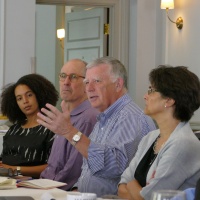Working Group Convenes on the History of American Democracy

On July 15th and 16th, the Tobin Project held a meeting of our working group on the History of American Democracy. Organized by Tobin’s Institutions of Democracy initiative, this effort seeks to develop research on the factors that contribute to the strength and vibrancy of American democracy and how democratic institutions have functioned and evolved over time.
Tobin launched this working group at a meeting in May 2018, where participants workshopped short write-ups of research questions that could generate a deeper understanding of how democracy works and encourage further inquiry by scholars, educators, and practitioners. At the most recent meeting, fourteen historians, political scientists, and legal scholars presented and discussed working papers and book chapters related to a set of guiding questions on the History of American Democracy:
- What institutions—both formal and informal—have shaped the substance, process, and extent of democratic decision-making across American history? How have these institutions functioned and evolved over time? What factors have led these institutions to become more or less accessible and/or responsive over time?
- What factors have shaped how “the people” have been defined in the United States over time, including at different levels of government? Which people have been included and excluded, and how has the logic for inclusion and exclusion changed over time? What have been the implications of these changes for conceptions of the public interest?
- Political theorists going back to James Madison have pointed out important weaknesses in representative democracy, including the potential for elites to take control of the policymaking process (policy capture) and the ever-present danger that majorities will use their political power to abuse minorities (tyranny of the majority). With this in mind, what factors have allowed or restrained policy capture by elites, and which have allowed or restrained “tyranny of the majority” over the course of American history?
- Over time, what factors have enabled or suppressed meaningful participation in self-governance beyond (or apart from) the vote, particularly with respect to individuals and groups excluded from the franchise?
- How has the existence of multiple levels of government—as well as overlapping jurisdictions, constituencies, and sovereignties—shaped American democracy?
We are excited by the range and rigor of the projects presented and are especially grateful for the guidance of the working group’s leaders: Maggie Blackhawk (Assistant Professor of Law, University of Pennsylvania Law), Laura Edwards (Peabody Family Professor of History in Trinity College of Arts and Sciences, Duke University), and Naomi Lamoreaux (Stanley B. Resor Professor of Economics and History, Yale University). We thank them and all the workshop participants for their meaningful contributions to the event and for their work towards advancing our understanding of American democracy and the practices that have shaped it.

